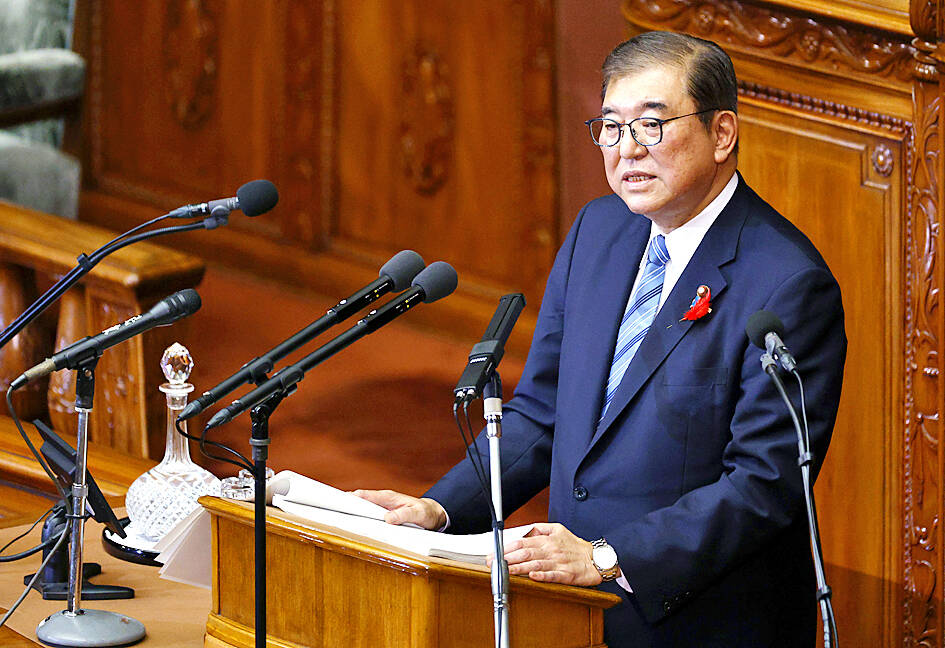Japanese Prime Minister Shigeru Ishiba yesterday warned in his first policy speech that “today’s Ukraine could be tomorrow’s East Asia,” while also dubbing the nation’s low birthrate a “quiet emergency.”
“Many fear that today’s Ukraine could be tomorrow’s East Asia. Why did deterrence not work in Ukraine?” Ishiba told lawmakers.
“Combined with the situation in the Middle East, the international community is becoming increasingly divided and confrontational,” the 67-year-old former Japanese minister of defense said.

Photo: EPA-EFE
Ishiba made no direct reference to China, but his nation’s relations with Beijing have deteriorated as it asserts its military presence around disputed territories in the region. Of particular concern is Taiwan.
Japan has also irked China with plans for a major increase in defense spending and by boosting security ties with the US and its allies, including the Philippines and South Korea.
A Chinese military aircraft in August staged the first confirmed incursion by China into Japanese airspace, followed weeks later by a Japanese warship sailing through the Taiwan Strait for the first time.
Ishiba has backed the creation of a regional military alliance along the lines of NATO, saying on Tuesday that the security environment in Asia is “the most severe since the end of World War II.”
Japan, like many developed nations, is facing a looming demographic crisis as its population ages and the birthrate stays stubbornly low.
The nation has the world’s oldest population after Monaco, according to the World Bank.
Last year, its birthrate — the average number of children a woman is expected to have in her life — stood at 1.2, well below the 2.1 needed to maintain the population.
Ishiba yesterday called the birthrate situation a “quiet emergency,” adding that the government would promote measures to support families such as flexible working hours.
Kishida was unpopular with voters because of a string of scandals and inflation squeezing earnings in the world’s fourth-biggest economy.
Ishiba wants to boost incomes through a new monetary stimulus package, as well as support for local governments and low-income households.
Within this decade, he said he wants to hike the average ¥1,500 (US$10.26) per hour, up nearly 43 percent from ¥1,050.
The yen surged on Friday last week after the Liberal Democratic Party (LDP) voted Ishiba its new leader, because he had broadly backed the Bank of Japan’s exit from its ultra-loose policies, but Ishiba late on Wednesday told reporters he did not think the environment was right for further interest rate hikes, sending the Japanese currency south.
Yesterday afternoon, US$1 bought ¥146.02, having slightly recovered from levels past ¥147 earlier this week.
Ishiba also weighed in on the dearth of eligible male heirs to the imperial throne.
Male-only succession rules mean the imperial family is facing extinction, with only one young heir: Emperor Naruhito’s 18-year-old nephew Prince Hisahito.
“Stable royal succession is extremely important. Stabilizing the number of members of the imperial family is a particularly urgent issue,” Ishiba told lawmakers, calling for a debate on the issue.

AIR SUPPORT: The Ministry of National Defense thanked the US for the delivery, adding that it was an indicator of the White House’s commitment to the Taiwan Relations Act Deputy Minister of National Defense Po Horng-huei (柏鴻輝) and Representative to the US Alexander Yui on Friday attended a delivery ceremony for the first of Taiwan’s long-awaited 66 F-16C/D Block 70 jets at a Lockheed Martin Corp factory in Greenville, South Carolina. “We are so proud to be the global home of the F-16 and to support Taiwan’s air defense capabilities,” US Representative William Timmons wrote on X, alongside a photograph of Taiwanese and US officials at the event. The F-16C/D Block 70 jets Taiwan ordered have the same capabilities as aircraft that had been upgraded to F-16Vs. The batch of Lockheed Martin

GRIDLOCK: The National Fire Agency’s Special Search and Rescue team is on standby to travel to the countries to help out with the rescue effort A powerful earthquake rocked Myanmar and neighboring Thailand yesterday, killing at least three people in Bangkok and burying dozens when a high-rise building under construction collapsed. Footage shared on social media from Myanmar’s second-largest city showed widespread destruction, raising fears that many were trapped under the rubble or killed. The magnitude 7.7 earthquake, with an epicenter near Mandalay in Myanmar, struck at midday and was followed by a strong magnitude 6.4 aftershock. The extent of death, injury and destruction — especially in Myanmar, which is embroiled in a civil war and where information is tightly controlled at the best of times —

China's military today said it began joint army, navy and rocket force exercises around Taiwan to "serve as a stern warning and powerful deterrent against Taiwanese independence," calling President William Lai (賴清德) a "parasite." The exercises come after Lai called Beijing a "foreign hostile force" last month. More than 10 Chinese military ships approached close to Taiwan's 24 nautical mile (44.4km) contiguous zone this morning and Taiwan sent its own warships to respond, two senior Taiwanese officials said. Taiwan has not yet detected any live fire by the Chinese military so far, one of the officials said. The drills took place after US Secretary

THUGGISH BEHAVIOR: Encouraging people to report independence supporters is another intimidation tactic that threatens cross-strait peace, the state department said China setting up an online system for reporting “Taiwanese independence” advocates is an “irresponsible and reprehensible” act, a US government spokesperson said on Friday. “China’s call for private individuals to report on alleged ‘persecution or suppression’ by supposed ‘Taiwan independence henchmen and accomplices’ is irresponsible and reprehensible,” an unnamed US Department of State spokesperson told the Central News Agency in an e-mail. The move is part of Beijing’s “intimidation campaign” against Taiwan and its supporters, and is “threatening free speech around the world, destabilizing the Indo-Pacific region, and deliberately eroding the cross-strait status quo,” the spokesperson said. The Chinese Communist Party’s “threats